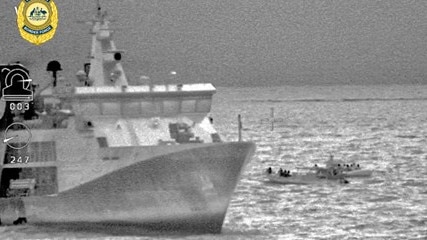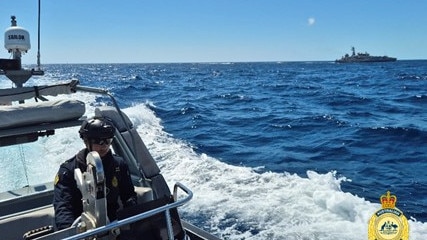70 boatpeople turned back to Indonesia as surge hits monthly high
More than 70 boatpeople bound for Australia have been turned back to Indonesia in July, with this month already the single biggest month for unauthorised arrivals by boat since September.

More than 70 boatpeople bound for Australia have been turned back to Indonesia in July, with this month already the single biggest month for unauthorised arrivals by boat since the latest surge in people-smuggling activity kicked off last September.
Another 44 boatpeople bound for Australia arrived back in Indonesia on Monday, in the largest known single intercept to have occurred during the latest human trafficking resurgence.
Indonesian police found the men – 36 Bangladeshi and eight Rohingya – washed up in two different locations on Indonesia’s southernmost island, Rote Ndao.
The men told police they were trying to reach Australia from West Java’s southern coast but were intercepted at sea by Australian Border Force. They said they were detained in their vessel for 18 days before they were given two boats – each capable of carrying 22 people – along with food, water, lifejackets and just enough fuel to reach Rote, some 286km from Australia’s Ashmore reef.
Before now, the largest confirmed single people-smuggling venture targeting Australia in the current wave was the boat carrying 39 Pakistani and Bangladeshi men that reached the mainland north of Broome in February.
The asylum-seekers apprehended on Monday are the second group in just over a week to have landed on Indonesian shores after being turned away from Australia.
Last week, 28 foreign nationals and two Indonesian crew landed on a remote beach in the southern coast of West Java’s Sukabumi.
They too told how they were given a new boat after their original vessel was seized by Australian authorities and destroyed.

Rote Ndao police chief Mardiono told The Australian that the 44 people involved in the latest incident had been instructed to steer their boats to his island.
“They said they were told ‘You take this boat with these passengers to Rote, back to Indonesia’,” he told The Australian on Wednesday.
“They beached the boats when they see land because they’ve run out of fuel.
“When we checked the boats, they’ve run out of everything so they had no other choice than to land. I think (Australian authorities) have calculated how much fuel they need to get here.”
He said the Malay-speaking immigrants had learned about the possibility of going to Australia through Indonesia via social media.
“They were on TikTok and found someone who’s been in Australia and asked them how to get there,” he said.
The 44 men in Rote are now being processed by Indonesian immigration authorities since police found no indication that they were smugglers themselves.
Police have yet to confirm whether the two landings, the one in Sukabumi last week and the one in Rote Ndao on Monday, were from the same group, though the immigrants who landed in Rote said they also boarded from southern Java in a wooden boat that was crewed by two Indonesians, and that the total passengers in the boat was 72 people.
Opposition immigration spokesman Dan Tehan told The Australian that people-smugglers had “smelled weakness” from the Albanese government on immigration.
“The government needs to come out and send a very clear message that they have very strong resolve when it comes to turning boats back and doing everything they can to keep our borders safe.
“If not, we’re going to see this continuously,” he said.
“The most important first step the Prime Minister can take to send this message is to dump the Immigration Minister, who is seen in Australia and no doubt overseas as weak and incompetent.”
The latest incident was also the second people-smuggling case at Rote Ndao in recent months.
Two Chinese nationals tried to enter Australia in May with the help of three Indonesian fishermen, but they were intercepted by Australian authorities. They were also provided with a boat and a GPS pre-programmed with coordinates for Rote Island.
Australian navy personnel escorted them to the Australia-Indonesia maritime boundary.
Earlier in May, Indonesian fishing authorities in Kupang, East Nusa Tenggara, intercepted a heavily modified fishing boat owned by an Indonesian-based Chinese national who was found to be carrying six other Chinese men trying to reach Australia.
They were arrested when they were still in Indonesian waters.
Official data released by the ABF says there have been 125 people intercepted either on land or in Australian waters between September and the end of May.
The Australian has requested comment from the ABF about the two incidents.
The office of Home Affairs Minister Clare O’Neil declined to comment.
The rise in people-smuggling activity is one of several trouble spots in immigration and home affairs, amid the ongoing fallout from the High Court-ordered release of more than 150 convicted criminals who were stuck in indefinite detention and the urgent rewriting of Immigration Minister Andrew Giles’s Ministerial Direction 99 after it had led to dozens of serious offenders being spared deportation.


